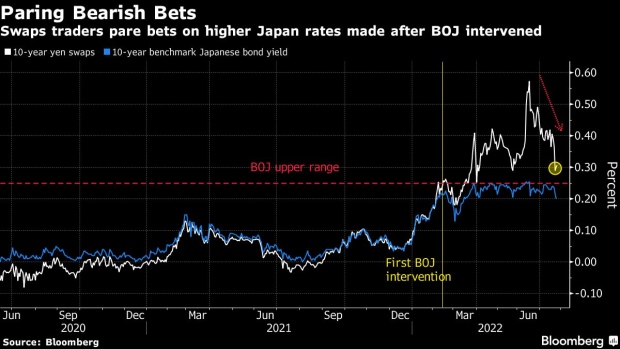Jul 26, 2022
BlueBay Refuses to Back Down on Japan Bond Short as Yields Fall
, Bloomberg News

(Bloomberg) -- BlueBay Asset Management is committed to its bet against Japanese bonds despite a global debt rally that has led to a sharp retreat in yields.
“We have been looking for the Bank of Japan to signal a policy shift in September as inflation continues to rise with the yen trending weaker as policies diverge,” said Mark Dowding, London-based chief investment officer of the $112 billion fund. “This continues to be the case.”
A rapid drop in Japanese bond yields Monday had market participants wondering if any overseas investors braving the so-called ‘Widowmaker’ trade had cut and run from short positions. The current benchmark yield fell to as low as 0.18% Monday -- well below the Bank of Japan’s 0.25% yield cap -- while the previous benchmark’s yield fell below 0.10%, levels that suggested some stop-losses may have been triggered.
Dowding doubted anyone was stopped out of their positions, suggesting there was little recent newsflow to change what was likely a structural view among investors. He did say he expected funds to be actively managing their positions.
“As at this morning 10-year yields are at 0.21%,” he said Tuesday. “We entered the position at 0.23% so truthfully speaking nothing has really happened.”
The Japanese sovereign bond market -- the world’s second largest -- has been roiled by speculative attacks over the past two months as traders bet accelerating global inflation would force the BOJ to tweak policy. Now those inflation fears have given way to trepidation that tighter central-bank moves across much of the globe will stifle economic growth.
Ten-year yen swap rates -- which are popular with international funds -- have collapsed from their mid-June highs, suggesting a paring of at least the most speculative bets against Japan’s bonds amid increased concern about a global recession. But rates are still above the central bank’s 0.25% line in the sand, suggesting some investors are sticking to their guns on a BOJ tweak down the line.
For Kellie Wood, a fixed-income money manager at Schroders Plc in Sydney it would take confirmation that inflation is finally in retreat for her to reassess her bearish bet on Japan’s bonds. The recent weakness in the securities could soon reverse if Treasury yields rise again.
“We need to see the peak in inflation and a shift more dovishly by central banks to cut the short in JGBs,” said Wood. “If we see further underperformance of US Treasuries, again that puts more pressure on the BOJ to relinquish yield curve control.”
UBS Asset Management is on the same page with portfolio manager Tom Nash calling it a low-cost “sleeper trade” as long as inflation and global yields remain elevated and significant upside if curve control breaks.
And as for Bluebay, they are happy to stay short.
“We have made no changes to our position and maintain a short stance,” Dowding said. “There is no specific level we will stop out of trades. That is not how our investment process works.”
(Adds comment from UBS Asset Management.)
©2022 Bloomberg L.P.






